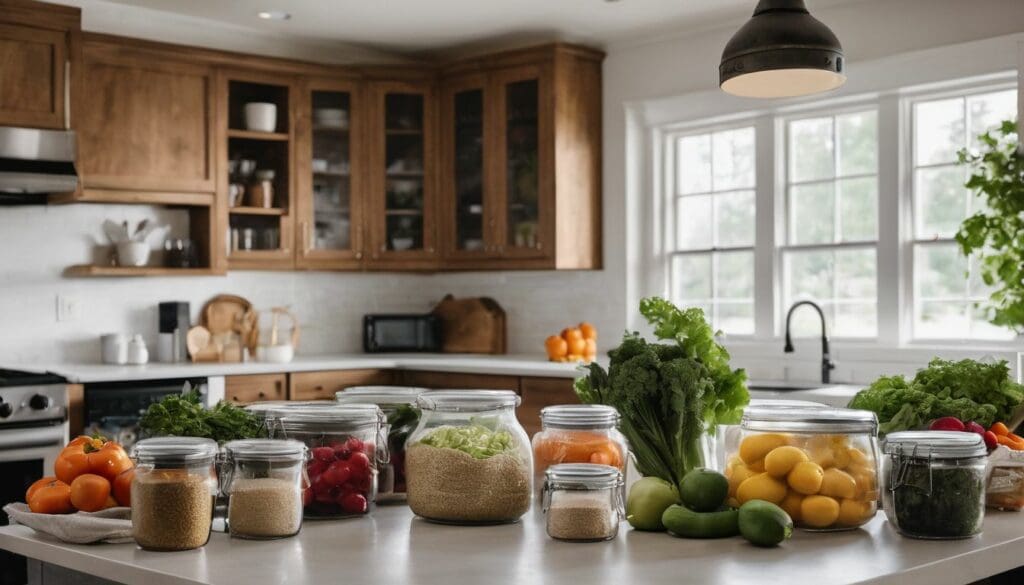Have you ever stopped to consider the trail of waste you leave behind? It’s an invisible mark, yet it weighs heavily on our planet. As a dedicated advocate for sustainable living, I’ve witnessed first-hand the transformative power of zero-waste practices—not just as ideals but actionable ways to heal our environment.
With years spent exploring and sharing eco-friendly lifestyles, my journey has shown that even one person’s shift in habits can ripple into profound change.
Embarking on a Zero Waste Challenge is more than just minimising your trash—it’s embracing a mindset that values resources and nurtures the Earth. This week-long adventure isn’t merely about disposing of less; it’s learning the incredible benefits of sustaining a lifestyle harmonious with nature.
Through this article, we’ll guide you through every step to show how simple choices lead to significant impacts. Ready to make a difference? Let’s dive in!
Key Takeaways
- The Zero Waste Challenge encourages individuals to minimise waste by making conscious daily choices such as using reusable containers and avoiding single-use plastics.
- Simple actions like composting, buying in bulk, and choosing products with minimal packaging during the challenge can greatly reduce one’s environmental impact and encourage sustainable living habits.
- Living waste – free not only helps protect the environment by reducing landfill contributions but also saves money through decreased spending on disposable items.
- Getting started on a zero-waste lifestyle involves preparation such as researching eco-friendly practices, planning meals that produce less waste, and gathering supplies like cloth bags and glass jars.
- Participating in community efforts, learning about recycling options, and seeking out zero – waste stores are important steps towards successful completion of the Zero Waste Challenge.
What is the Zero Waste Challenge?
The Zero Waste Challenge is an opportunity to reduce waste and make a positive impact on the environment through conscious consumption and minimal waste production. It involves making small changes that can lead to big differences in reducing our environmental footprint.
A chance to reduce waste and make a positive impact
Tackling the Zero Waste Challenge offers you a unique opportunity to slash the amount of rubbish you produce and set a positive example for eco-conscious living. Small steps, like refusing single-use plastics or upcycling products, can significantly cut down on waste that often ends up in landfills or oceans.
By adopting minimal waste habits, everyone contributes to reducing the environmental impact caused by excessive consumption.
Living sustainably isn’t just good for the planet – it’s also beneficial for personal growth. Individuals who commit to this challenge frequently discover innovative ways to reduce, reuse, and recycle resources.
These practices not only promote green living but also help foster an ecofriendly lifestyle within communities aiming at substantial environmental conservation. Each person’s efforts serve as inspiration, proving one week of conscious consumption can ignite long-lasting change for a healthier Earth.
Small changes can make a big difference
Taking on the Zero Waste Challenge might seem daunting, but small changes can make a big difference. Simple adjustments like using reusable containers, opting for products with minimal packaging, and composting food scraps can significantly reduce waste.
Embracing a zero-waste lifestyle not only benefits the environment by lessening pollution and reducing landfill waste but also encourages sustainable consumption practices. By making these small changes, individuals contribute to a more environmentally friendly future while fostering a greater sense of environmental awareness within their communities.
As we delve into the challenge of living waste-free for seven days, it becomes evident that embracing a zero-waste lifestyle is achievable through simple yet impactful choices. Whether it’s choosing to carry reusable shopping bags or shifting towards plastic-free living, every small action contributes to a larger positive impact on the environment.
The Benefits of Zero Waste Living
Living a zero waste lifestyle helps protect the environment, saves money, and encourages healthier habits.
Helps protect the environment
Participating in the Zero Waste Challenge contributes to protecting the environment by reducing the amount of waste sent to landfills and minimising pollution from non-recyclable materials.
This sustainable lifestyle choice supports conservation efforts and promotes eco-conscious living, creating a positive impact on local communities and ecosystems. By embracing a zero-waste mentality, individuals can actively contribute to preserving natural resources, reducing energy consumption, and mitigating environmental degradation caused by excessive waste production.
Adopting a zero-waste lifestyle not only minimises landfill waste but also reduces carbon emissions associated with production, transportation, and disposal processes. Taking small steps towards waste reduction can lead to significant benefits for the environment – from cleaner air and waterways to healthier ecosystems that support biodiversity.
Saves money
Living a zero-waste lifestyle not only benefits the environment but also leads to significant cost savings. By reducing single-use items and minimising waste, individuals can lower their monthly expenses on disposable products and packaging.
Through practical steps such as using reusable containers, buying in bulk, and repurposing items, one can cut down on unnecessary spending while contributing to a more sustainable future.
Adopting sustainable practices not only reduces environmental impact but also positively impacts personal finances. Making simple changes in consumption habits can lead to substantial financial savings over time.
Transitioning towards a zero-waste lifestyle is an opportunity for individuals to align their values with their actions while being mindful of both the planet and their pockets.
Encourages healthier habits
Making sustainable choices and reducing waste can lead to healthier habits for both individuals and the environment. As part of the Zero Waste Challenge, embracing a low-impact lifestyle encourages mindful consumption and promotes healthier living.
By opting for plastic-free living and minimalistic practices, individuals naturally steer towards a more ecoconscious way of life, ultimately contributing to waste management and protecting the environment.
A zero-waste lifestyle fosters awareness around personal consumption habits, thus prompting individuals to make better choices in their purchasing decisions as they become more cognisant of the impact on the planet.
Additionally, participating in initiatives such as Zero Waste Week not only supports conservation efforts but also encourages communities to embrace an environmentally friendly future.
Getting Started with the Challenge
To get started with the Zero Waste Challenge, it’s important to research and plan ahead. Gather necessary supplies such as reusable containers, bags, and bottles to help reduce waste throughout the week.
Research and plan
To embark on the Zero Waste Challenge, it’s essential to conduct thorough research and plan ahead. Understanding the concept of zero waste living and learning about practical tips for reducing waste will be crucial in preparing for the challenge.
Researching local resources for bulk shopping, composting facilities, and recycling centres can aid in gathering necessary supplies to support a waste-free lifestyle. Planning meals that produce minimal food waste and identifying alternatives to single-use plastic items are key elements of successful preparation.
Taking the time to research eco-friendly products and sustainable practices will help participants feel confident as they begin their journey towards a zero-waste lifestyle. Engaging with online communities or attending workshops that focus on low-impact living can provide valuable insights when planning for the challenge.
Gather necessary supplies
To embrace the Zero Waste Challenge, start by gathering necessary supplies like reusable water bottles, shopping bags, and food containers. By having these items on hand at all times, you can reduce your reliance on single-use plastics and packaging.
Additionally, consider investing in a compost bin to manage organic waste and contribute to a circular economy. These simple steps align with the principles of low-impact living and plastic-free living, supporting conservation efforts while reducing landfill waste.
Engage in eco-conscious living by replacing disposable household items with sustainable alternatives such as bamboo toothbrushes, cloth napkins, and refillable cleaning products. Embracing a minimalist lifestyle encourages conscious consumption and supports the zero-waste movement – empowering individuals to make small changes that collectively have a significant positive impact on the environment.
Zero Waste Challenge: Living Waste-Free for 7 Days
Explore the day-by-day breakdown of activities and get valuable tips and tricks for success in living waste-free for a week. Get inspired to take on the challenge yourself!
Day-by-day breakdown of activities
Day 1: Sort and separate waste into recyclables, compostables, and non-recyclables. Use designated bins for each category to make the process efficient.
Tips and tricks for success
To succeed in the Zero Waste Challenge, start by conducting thorough research and planning your approach. Gather necessary supplies such as reusable containers, cloth bags, and products with minimal packaging.
Embrace small changes like using a refillable water bottle, bringing your own shopping bags, and buying in bulk to reduce waste. Educate yourself about composting and recycling techniques while staying committed to making sustainable choices.
Get creative by repurposing items or finding new uses for old materials to minimise waste generation.
Commit to reducing single-use plastics by choosing eco-friendly alternatives whenever possible and opting for products with biodegradable or compostable packaging. Engage in community events that promote zero-waste living to learn from others’ experiences and discover additional tips for navigating challenges effectively.
Conclusion: What I Learned from the Zero Waste Challenge
The Zero Waste Challenge has had a positive impact on the environment and has led to changes in personal habits. As a result, I am continuing to make efforts towards a waste-free lifestyle.
Positive impact on the environment
Living a zero-waste lifestyle has a positive impact on the environment by reducing land pollution and minimising the amount of waste sent to landfills. Embracing eco-conscious, plastic-free living encourages healthier habits and supports conservation efforts.
Participating in the Zero Waste Challenge can help individuals and communities work towards a more sustainable and environmentally friendly future, fostering low-impact living for a healthier planet.
Making small changes to reduce waste has been shown to have a big impact on protecting the environment. This mindset shift can lead to long-term benefits for both personal wellness and environmental sustainability, inspiring others to join the movement for a cleaner, greener planet.
Moving forward with these practices ensures that we are all contributing positively towards our shared goal of preserving our beautiful Earth for generations to come.
Changes in personal habits
Embracing the Zero Waste Challenge prompts individuals to make significant adjustments to their daily routines. This may involve using reusable containers for food storage, carrying a refillable water bottle, and opting for products with minimal or no packaging.
Additionally, consciously reducing one’s consumption of single-use items like plastic bags and straws leads to the cultivation of eco-conscious habits that contribute to a greener lifestyle.
Transitioning towards a zero-waste way of living requires making deliberate choices in everyday activities. These alterations include selecting sustainable alternatives such as cloth napkins instead of disposable ones and opting for homemade cleaning products over store-bought options containing harmful chemicals.
Continued efforts towards a waste-free lifestyle
Embracing changes in personal habits can lead to continued efforts towards a waste-free lifestyle. Making sustainable choices, such as using reusable products, composting food scraps, and reducing single-use plastics, contributes to a lower environmental impact.
It’s crucial for individuals to remain mindful of their consumption and disposal habits while seeking alternatives that align with eco-conscious living. By supporting the zero-waste movement and advocating for plastic-free living, environmentally conscious individuals can actively work towards a more sustainable future.
FAQs
1. What is the Zero Waste Challenge?
The Zero Waste Challenge is a test to see if you can avoid creating rubbish for one whole week, supporting low-impact and plastic-free living.
2. Why should I try living waste-free for a week?
Trying to live waste-free encourages eco-conscious living and helps reduce your environmental footprint as part of the zero-waste movement.
3. Can going zero waste save me money?
Absolutely! By adopting practices from the zero-waste challenge, such as reusing items and avoiding unnecessary packaging, you could spend less money over time.
4. Is it hard to find zero waste alternatives for daily use?
Not really; many shops now support eco-conscious lifestyles by offering products that help maintain a low-impact way of life without generating waste.





